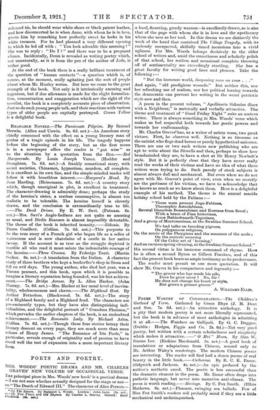POETS AND POETRY.
MRS. WOODS' POETIC DRAMA AND MR. CHARLES GRAVES' NEW VOLUME OF OCCASIONAL VERSE. Tag principal piece in Mrs. Woods' new book' is a poetical drama —I am not sure whether actually designed for the stage or not— on "The Death of Edward ILL" The character of Alice Perrers--
• (1) The Return. By Margaret L. Woods. London: John Lane. I. net.1 ----(2) New Times and Old Rhymes. By Charles L. Gravel. Oxford : Basil Blackwell We. WU
a hard, flaunting, greedy wanton—is excellently drawn, as is also that of the page with whom she is in love and the apothecary whom she uses as her tool. In this drama we see distinctly the work of the hand that contrived The Village Tragedy, with its curiously unexpected, skilfully timed incursions into a vivid ugliness. For Mrs. Woods belongs decisively to the older school of writers and, amid the smoothness and scholarly polish of that school, her realism and occasional complete throwing off of sentimentality are exceedingly startling. She has a great faculty for writing good lines and phrases. Take the following :—
" But the immense world, deepening zone on zone . . ." And again, " old prodigious wounds." But neither this, nor her refreshing use of realism, nor her political loaning towards the democratic can prevent her writing in the worst patriotio style now and then.
A poem in the present volume, " Apollinaris Sidonius dines with a Neighbour," is metrically and verbally attractive. Tho theme and treatment of " Good Friday Night " suits an austere writer. There is always something in Mrs. Woods' verso which makes us feel respectful both towards her poetic powers and towards her craftsmanship.
Mr. Charles Graves' has, as a writer of satirio verse, two great virtues. First, he observes well. Nothing is so tiresome as the satirist who flogs dead homes or purely hypothetical unicorns. There are one or two such writers now publishing who are apt to write about the Sitwells and then, perhaps to show how broadminded they are, to have a shot at Sir Henry Newbolt's style. But it is perfectly clear that they have never really read the works of their victims and have no idea of what these writers were trying to do. Such parody of stock subjects is almost always dull and mechanical. But oven when wo do not agree with Mr. Graves's point of view, even when we secretly are the partisans of his victims, we have to acknowledge that he knows as much as we know about them. Here is a delightful example of his method. The theme is the annual seaside holiday school held by the Fabians :- " There were present Jugo-Fabians, Theosophio Astrolabians, Several blameless Bessarabians and Koreans from Seoul ; With a brace of Finn historians, Some Rabindranath-Tagorians, And a group of Montessorians, at the Swabian Summer School.
We had talks on breeding pigeons, On polygamous religions, On the musio of the Phrygians and the manners of the mule ; On the esoteric meaning Of the Celtic art of ' keening,' And on vacuum spring-cleaning, at the Swabian Summer School."
His second virtue is his immense command of rhyme. Here he is often a second Byron or Gilbert Frankau, and of this fact the present book bears as ample testimony as its predecessors.
The reader must permit us one more quotation. It will show Mr. Graves in his compactness and ingenuity :- " The grocer who has made his pile, Does he grow nicer ? No, Sir I He does not change his heart or style, But grows a grosser grocer."
A. WThmiNS-Euis.










































 Previous page
Previous page